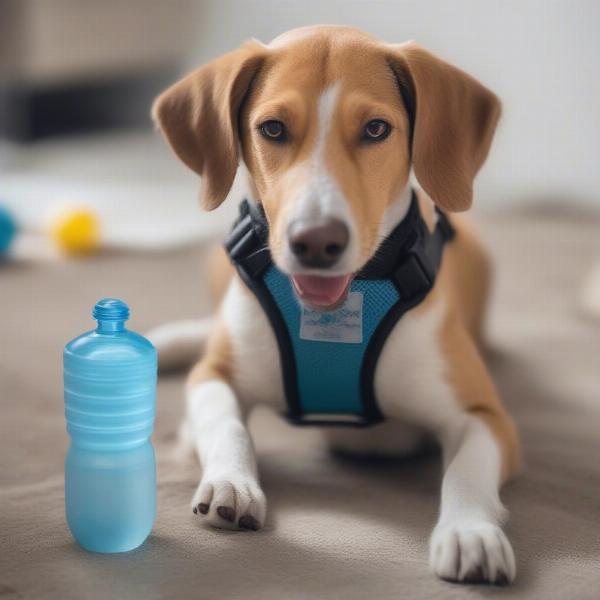Dog laryngitis, an inflammation of the larynx (voice box), can cause discomfort and distress in our canine companions. Understanding the causes, symptoms, and treatment options for this condition is crucial for any responsible dog owner. This article will provide you with a comprehensive guide to dog laryngitis, equipping you with the knowledge to ensure your furry friend receives the best possible care.
Laryngitis in dogs can stem from various factors, from excessive barking to underlying infections. Recognizing the signs early on is vital for effective treatment. We’ll explore the common symptoms, diagnostic methods, and treatment options available, including home care and veterinary interventions. Whether you’re a seasoned dog owner or new to the world of canine care, this guide will empower you to navigate dog laryngitis with confidence.
Recognizing the Signs of Laryngitis in Your Dog
Identifying dog laryngitis starts with observing changes in your dog’s voice and behavior. A hoarse or weakened bark, sometimes even a complete loss of voice, is a key indicator. Other symptoms include a dry, hacking cough, difficulty swallowing, and noisy breathing. In some cases, your dog might exhibit signs of pain when touched around the throat area.
Common Causes of Dog Laryngitis
Several factors can contribute to laryngitis in dogs. Excessive barking, particularly during playtime or when guarding, can strain the vocal cords, leading to inflammation. Infections, such as kennel cough or upper respiratory infections, can also cause laryngitis. Inhaling irritants, like smoke or dust, can also trigger the condition. Less common causes include tumors or foreign objects lodged in the throat.
“It’s important to remember that persistent barking can be a sign of underlying anxiety or stress in your dog,” says Dr. Emily Carter, DVM, a veterinary specialist in canine respiratory health. “Addressing these underlying issues is crucial for preventing recurring bouts of laryngitis.”
Diagnosing and Treating Dog Laryngitis
If you suspect your dog has laryngitis, a visit to the veterinarian is essential. The vet will perform a physical examination, paying close attention to the throat and respiratory system. They may recommend further tests, such as blood work or X-rays, to rule out other conditions and identify the underlying cause.
Treatment for dog laryngitis varies depending on the severity and underlying cause. For mild cases, rest and voice restriction are often sufficient. Your vet might prescribe anti-inflammatory medication to reduce swelling and pain. In cases of bacterial infection, antibiotics will be necessary. For more severe cases, hospitalization and supportive care might be required.
Home Care for Dogs with Laryngitis
While veterinary care is crucial, there are several things you can do at home to support your dog’s recovery. Ensure your dog rests in a quiet and comfortable environment. Provide plenty of fresh water to keep them hydrated. Using a humidifier can help soothe irritated airways. Avoid exposing your dog to irritants like smoke or dust.
“Creating a calm and stress-free environment is crucial for dogs recovering from laryngitis,” advises Dr. Carter. “Minimizing barking and ensuring adequate rest can significantly speed up the healing process.”
Preventing Laryngitis in Your Canine Companion
Prevention is always better than cure. While not all causes of laryngitis are preventable, there are steps you can take to reduce the risk. Discouraging excessive barking, using a harness instead of a collar to minimize pressure on the throat, and avoiding exposure to irritants can help protect your dog’s vocal cords.
 Preventing Dog Laryngitis
Preventing Dog Laryngitis
Conclusion
Dog laryngitis can be a concerning condition, but with prompt diagnosis and appropriate treatment, most dogs recover fully. Understanding the causes, symptoms, and treatment options empowers you to provide the best possible care for your furry friend. Remember to consult your veterinarian for any health concerns and always prioritize your dog’s well-being.
FAQ
- How long does dog laryngitis last? Most cases of mild laryngitis resolve within a week or two with proper care.
- Can dog laryngitis be contagious? If the laryngitis is caused by an infectious agent, such as kennel cough, it can be contagious to other dogs.
- What are the signs of severe laryngitis in dogs? Difficulty breathing, high fever, and loss of appetite are signs of severe laryngitis that require immediate veterinary attention.
- Is honey good for dogs with laryngitis? While honey can be soothing for humans, it’s best to avoid giving it to your dog without consulting your vet.
- Can I give my dog cough medicine for laryngitis? Never give your dog human medication without consulting your vet, as some can be toxic to dogs.
- What should I feed my dog with laryngitis? Offer soft, easily swallowed food to minimize throat irritation.
- Can laryngitis be a sign of a serious underlying condition in dogs? In some cases, laryngitis can be a symptom of a more serious condition, such as a tumor or foreign body obstruction.
Related Articles:
- (If applicable, insert links to related articles on the website here)
About ILM Dog
ILM Dog provides expert advice and resources on all aspects of dog care, from breed selection and health to training and nutrition. We offer a wealth of information to help you provide the best possible care for your canine companion. Whether you are a new dog owner or a seasoned expert, ILM Dog is your trusted source for all things dog-related. Contact us for more information at [email protected] or call us at +44 20-3965-8624.